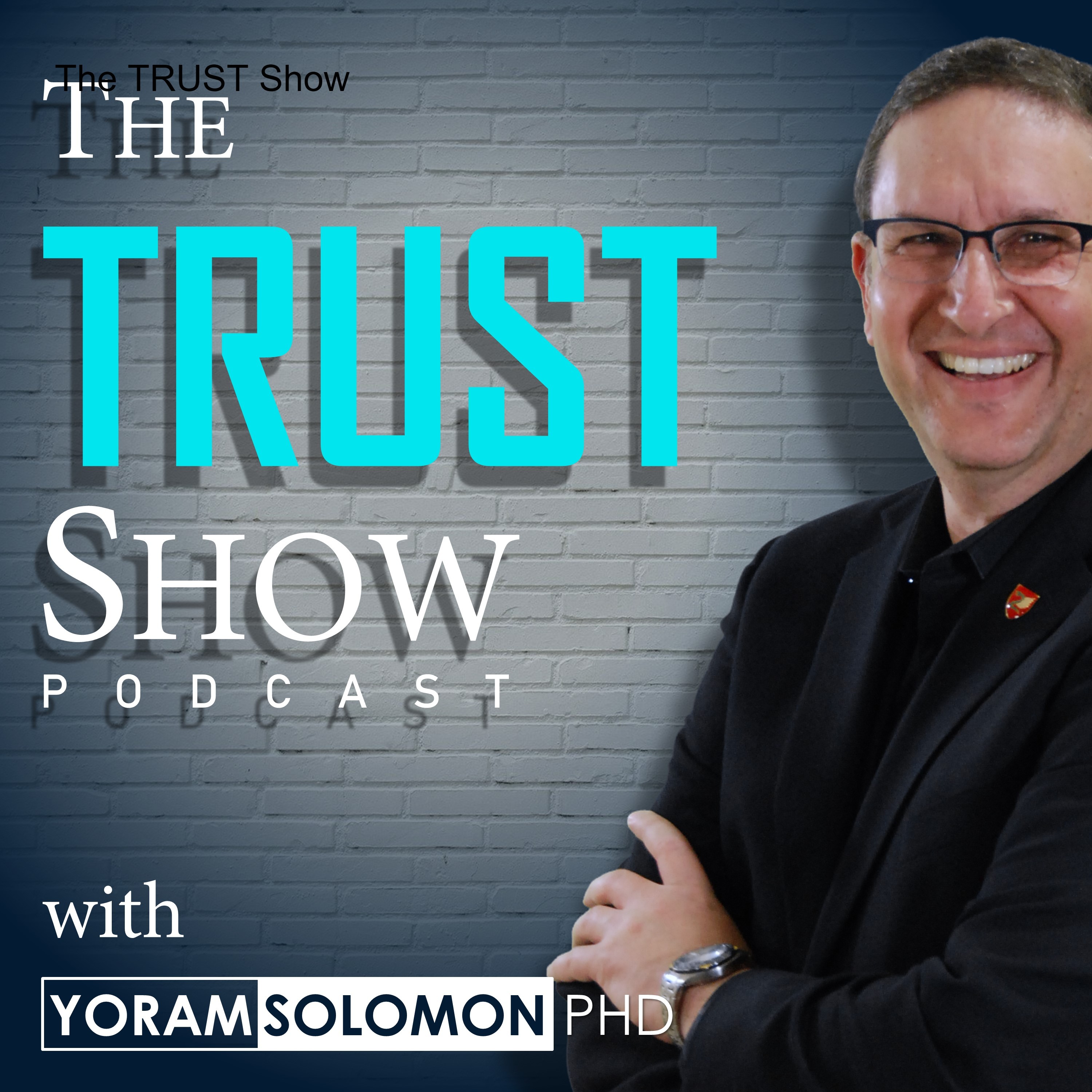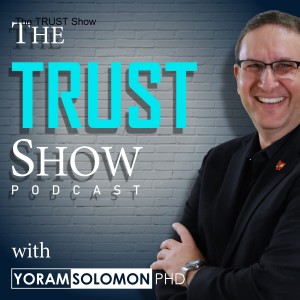
17.4K
Downloads
195
Episodes
Trust is not what you think it is. It is not absolute or universal. Trust is relative. The same behavior that would cause one person to trust you could cause another person to distrust you. The level of trust someone has in you is the product of their trustfulness (their willingness to trust other people) and your trustworthiness. There is almost (I said ALMOST) nothing you can do about the former, and everything you can do about the latter. Because of that, you must evaluate your own trustworthiness one relationship at a time, separately. Odds are, though, that the same behaviors that are holding you back from being more trusted in one relationship are holding you back from being more trusted in other relationships. Welcome to The Trust Show. I’m your host, Yoram Solomon, a top 10 trust expert and researcher, the author of the book of trust, and the creator of the Trust Habits® workshop that helps people and organizations form new habits that change old behaviors, build trust, and transform organizations. In this educational podcast, I will challenge you to think differently about trust, through the 8 laws of trust and the 6 components of trustworthiness. I will share my own stories, experiences of others, trust research, and sometimes, reflect on a news item. And through those, I will show you how to build trust, be trusted, and know who to trust. Because the answer to this question will have the biggest impact on your personal and professional, success or failure: can you be trusted?
Trust is not what you think it is. It is not absolute or universal. Trust is relative. The same behavior that would cause one person to trust you could cause another person to distrust you. The level of trust someone has in you is the product of their trustfulness (their willingness to trust other people) and your trustworthiness. There is almost (I said ALMOST) nothing you can do about the former, and everything you can do about the latter. Because of that, you must evaluate your own trustworthiness one relationship at a time, separately. Odds are, though, that the same behaviors that are holding you back from being more trusted in one relationship are holding you back from being more trusted in other relationships. Welcome to The Trust Show. I’m your host, Yoram Solomon, a top 10 trust expert and researcher, the author of the book of trust, and the creator of the Trust Habits® workshop that helps people and organizations form new habits that change old behaviors, build trust, and transform organizations. In this educational podcast, I will challenge you to think differently about trust, through the 8 laws of trust and the 6 components of trustworthiness. I will share my own stories, experiences of others, trust research, and sometimes, reflect on a news item. And through those, I will show you how to build trust, be trusted, and know who to trust. Because the answer to this question will have the biggest impact on your personal and professional, success or failure: can you be trusted?
Episodes

Sunday Jul 03, 2022
S6E1: Independence Day Stories
Sunday Jul 03, 2022
Sunday Jul 03, 2022
In this episode, recorded three days before the U.S. Independence Day 2022, I decided to share two personal stories related to it. The first is the story of getting my citizenship and something that happened during the final interview. The second story is about a strange email that I received in 2013, supposedly from the White House. Finally, I wanted to share the foreword for The Book of TRUST, written by the late Congressman Sam Johnson, who passed away four months after the book was published, and to whom I dedicated the book.

Sunday Jun 19, 2022
S5E12: The Relativity of TRUST, Yoram Solomon’s May 2022 TEDx Talk
Sunday Jun 19, 2022
Sunday Jun 19, 2022
To close the 5th season, this episode includes the actual soundtrack of Yoram's second TEDx talk, given in May 2022, titled "The Relativity of TRUST." In 13 minutes, he covers one of the main differentiators of his insights from his trust research, put in The Book of TRUST. Trust is not absolute or universal. It is relative. The exact same behavior could cause one person to trust you and another person to distrust you. For that reason, you must consider your trustworthiness independently, one relationship at a time. This episode starts with the background story for that TEDx talk.
Link to the TEDx talk: https://www.ted.com/talks/yoram_solomon_the_relativity_of_trust
Previous TEDx talk: https://www.ted.com/talks/yoram_solomon_the_day_that_forever_changed_american_culture_yoram_solomon_tedxoaklawn

Sunday Jun 12, 2022
S5E11: How do TRUSTED Companies Price their Products and Services?
Sunday Jun 12, 2022
Sunday Jun 12, 2022
This episode draws on my trust research and also my work as a professor of entrepreneurship. Often I ask my students: if a product (or service) costs you $100 to make, how much should you sell it for? This episode will address this question and the relationships between four components: cost, price, perceived value, and real value. In this episode, you will learn that the relationship between every two components determines the company's sustainability, market share, and trustworthiness. In other words, it determines whether customers will buy from it now, buy from it in the future, and whether it will be able to make money.

Sunday Jun 05, 2022
S5E10: What to do when you lose someone’s TRUST?
Sunday Jun 05, 2022
Sunday Jun 05, 2022
Previous episodes dealt with how to be more trustworthy and therefore trusted. But what happens when you lose someone’s trust in you? How do you recover from it? Should you even care? This episode will answer these questions and more and give you a framework to rebuild your trustworthiness once you lose it, using the framework of the 8 laws of trust and my 6-component trustworthiness mode.

Sunday May 29, 2022
S5E9: Can You TRUST a Spy?
Sunday May 29, 2022
Sunday May 29, 2022
My wife heads a Dallas community organization, and recently brought Erez Hasson, a speaker from Israel. For 26 years, Erez was an operator in the Israel Security Agency (ISA, parallel to U.S. NSA), which focuses on Counterterrorism activities in Israel, the West Bank, and the Gaza Strip. If you watched the Netflix show Fauda, his role was like that of Captain Ayob. He recruited spies within the Palestinian territories and then handled them to collect HumInt (Human Intelligence). Erez retired in 2018. I sat down with him and interviewed him for this episode. My main question was, how can you turn someone who hates you (and all Israelis) to a spy who works for you, and how can you trust him (or her)? I used my 8 laws of trust and my 6-component trustworthiness model, and here is what I learned.

Sunday May 22, 2022
S5E8: TRUST and Feedback—Part VI: Feedback and Feed Forward
Sunday May 22, 2022
Sunday May 22, 2022
There is a new approach to feedback, referred to as “feed-forward” (compared to “feed backward”, which is what the classic type of feedback is referred to). The idea behind “feed-forward” is that instead of giving feedback after the deed is done, when there is no opportunity to implement this feedback (at least not on the deed that was already done), you should give “course corrections” while the work is still being done. It is forward-looking (thus “feed-forward”) compared with backward-looking (thus “feed-back”). In this episode, I explain more about the philosophy of feed-forward, compare it with classical feedback, and provide tips on how to decide which one you should choose in a specific situation.

Sunday May 15, 2022
S5E7: TRUST and Feedback—Part V: How to Take Feedback
Sunday May 15, 2022
Sunday May 15, 2022
This is the fifth episode in the mini-series about TRUST and Feedback, and the second about TAKING feedback. In this episode, I will explain the importance of not being defensive when you get feedback, and what not to do when you get it. The episode will discuss again perception versus reality, but this time from the recipient’s perspective. Finally, it will explain how to benefit the most from the feedback you receive, and how to follow up after you received it.

Sunday May 08, 2022
S5E6: TRUST and Feedback—Part IV: Are you Ready to Take Feedback?
Sunday May 08, 2022
Sunday May 08, 2022
The fourth episode of the TRUST and Feedback mini-series starts to address taking feedback. First, why do I call it “taking” feedback and not “getting” or “receiving” feedback? Why is taking feedback important to you? What should you do if nobody gives you feedback (and why aren’t they giving you feedback?). You will learn what to do when you are offered feedback but are not ready to take it, and what to do when you suspect that feedback is given to you with ulterior motive.

Sunday May 01, 2022
S5E5: TRUST and Feedback—Part III: How to Deliver Feedback?
Sunday May 01, 2022
Sunday May 01, 2022
In the third episode of this mini-series about trust and feedback, you will learn how to deliver negative feedback in a constructive and effective way and how to be positive when you deliver negative feedback. You will also realize that there is such a thing as too much feedback, and how to deal with a recipient who doesn’t want to take your feedback. Finally, I will discuss my personal opinion of the “Feedback Sandwich” method (hint: I don’t like it).

Sunday Apr 24, 2022
Sunday Apr 24, 2022
This is the second of a six-episode mini-series about TRUST and feedback. This episode will discuss your reasoning for giving feedback and the relationship between perception and reality in your feedback. Once you know you want to give feedback, you will learn how to see if the recipient of feedback is ready to take your feedback, what to do if they are not, and when and where you should give that feedback.
